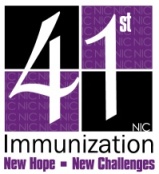
|
|
CDC NIP/NIC Home Page
|
Tuesday, March 6, 2007 - 4:05 PM
44
VMBIP: Changing the way we do business to improve the business of public health
Jan Hicks-Thomson, Immunization Program, Washington State Department of Health, P.O. Box 47843, Olympia, WA, USA
Learning Objectives for this Presentation:
By the end of the presentation participants will be able to:
1.Understand VMBIP as a paradigm shift not just a project.
2.Apply change management strategies.
3.Understand the interplay between policy and program infrastructure.
4. Generalize lessons learned from the VMBIP Pilot to program activities.
Background:
In Washington federal and state funds support universal access to vaccines for all children. 1150 providers received vaccine through a central state depot and a network of 34 local health depots, one a third party distributor. System complexities include: monitoring of a mix of state and local funds, unique configurations of health organizations, large clinic networks, small rural clinics, and demands and personalities of a variety of stakeholders. In 2005, Washington became a pilot site for CDC's VMBIP effort.
Setting:
Washington state.
Population:
Immunization providers, local health jurisdictions, and children.
Project Description:
Washington transitioned from central vaccine distribution at the state and local level to nationally centralized vaccine distribution through VMBIP. Stakeholder involvement, communication, training and information gathering were conducted through a variety of means. Staffing, program management, and training for state and local health and providers was coordinated to culminate in successful implementation. Dynamic relationships developed between state staff and registry staff. Paradigm shifts occurred in day to day business practices and the movement from a paper based system to an electronic system. Policy and staffing changes were aligned with the infrastructure changes. Flexibility and change management were applied at every step in the process. The pilot was completed while conducting all programmatic efforts, with limited additional staff support.
Results/Lessons Learned:
The importance of change management with stakeholders is paramount to success when undertaking a statewide initiative. Paradigm shifts require deep analysis of practice to redefine best practices and forge relationships to assure success. Big system changes can be successful, and VMBIP will work.
See more of Transitioning to Centralized Distribution
See more of The 41st National Immunization Conference (NIC)
See more of The 41st National Immunization Conference (NIC)